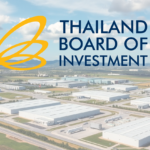Thailand’s rapid industrial growth has led to a surge in factory setups across the country, prompting increased regulatory measures to ensure safety and compliance. Factory safety regulations in Thailand are essential for protecting workers, the environment, and the public, while also ensuring businesses operate legally. Key legal frameworks such as the Factory Act B.E. 2535 (1992) and the Occupational Safety, Health, and Environment Act B.E. 2554 (2011) outline strict safety standards that every factory must follow.
This guide explores Thailand’s factory safety standards, the roles of key personnel like safety officers, licensing requirements, and strategies for achieving full compliance with factory safety regulations in Thailand.
Key Factory Safety Regulations in Thailand
Factory Act B.E. 2535 (1992)
The Factory Act serves as the cornerstone of factory safety regulations in Thailand. It governs the establishment, expansion, and operation of factories, emphasizing pollution control, safety measures, and environmental impact management. Key provisions include:
- Factory Licensing: To operate legally, factories must obtain a license from the Ministry of Industry. Licensing depends on factors such as the factory’s size, the type of machinery used, and potential environmental impact.
- Pollution Control: Factories must manage waste and emissions, including wastewater treatment, air quality management, and safe disposal of hazardous waste.
- Fire Safety and Machinery Standards: Specific guidelines must be followed for fire prevention and the safe operation of machinery to protect both workers and neighboring communities.
Occupational Safety, Health and Environment Act B.E. 2554 (2011)
This Act requires factories to provide safe working conditions and protect employees’ health. Factories with more than 20 employees must appoint a safety officer to ensure adherence to factory safety regulations in Thailand. Key responsibilities include:
- Risk Assessments: Regular assessments of workplace risks and implementation of safety controls are required.
- Safety Training: Workers must be trained in safety procedures, particularly in the use of machinery and handling of hazardous materials.
- Appointment of a Safety Officer: Safety officers are responsible for overseeing safety programs and ensuring compliance with safety standards.
The Role of the Safety Officer in Factory Safety
The safety officer plays a pivotal role in maintaining compliance with factory safety regulations in Thailand. For factories employing 20 or more workers, it is mandatory to appoint a safety officer to foster a safe work environment.
Key Responsibilities of a Safety Officer:
- Risk Management: Conducting regular risk assessments and audits to identify potential hazards. Safety officers implement corrective actions when risks are identified.
- Training and Education: Ensuring that all workers receive training on safe practices, including machinery operation and emergency procedures.
- Accident Investigation: Investigating accidents, identifying their causes, and recommending safety measures to prevent future incidents. They are also responsible for reporting accidents to authorities.
- Regulatory Compliance: Safety officers ensure that factories remain compliant with factory safety regulations in Thailand through regular inspections and by liaising with government agencies.
Licensing and Environmental Compliance
Factory Licensing
Securing a factory license from the Ministry of Industry is a crucial step in compliance. This process ensures that the factory meets the necessary factory safety regulations in Thailand. Factors affecting licensing include the factory’s size, location, and potential environmental impact.
- Amendment Update: An amendment in 2019 states that factory licenses no longer expire after five years, remaining valid as long as the factory is operational.
Environmental Regulations
Thailand’s Enhancement and Conservation of National Environmental Quality Act B.E. 2535 (1992) enforces strict pollution control measures. Factories are required to:
- Manage Pollution: Control air emissions, water pollution, and handle hazardous waste properly.
- Soil and Groundwater Monitoring: Ensure that factory activities do not contaminate soil or groundwater.
Failure to comply with these regulations can result in significant fines, operational suspensions, or even permanent closure.
Health and Safety Standards for Factory Workers
Thailand’s labor laws, overseen by the Department of Labor Protection and Welfare (DLPW), ensure the health and safety of factory workers. Compliance with these standards is an integral part of factory safety regulations in Thailand.
Workplace Inspections
Routine inspections ensure that factories comply with safety standards. Inspectors focus on:
- Machinery Safety: Verifying that machinery is maintained and safe for operation.
- Handling Hazardous Materials: Ensuring proper protocols for the storage and handling of chemicals and hazardous substances.
- Fire Safety: Checking that factories have implemented fire prevention measures such as alarms, extinguishers, and evacuation plans.
Accident Reporting and Compensation
Factories must report workplace accidents to the Department of Labor Protection and Welfare. Injured workers are entitled to compensation through Thailand’s Social Security Program, covering medical expenses, wage replacement, and disability benefits.
Best Practices for Ensuring Compliance with Factory Safety Regulations in Thailand
- Appoint a Qualified Safety Officer: A safety officer ensures that all safety protocols are met and maintains compliance with regulations.
- Conduct Regular Safety Audits: Regular audits help identify potential hazards before they become serious issues.
- Provide Continuous Training: Ongoing safety training for all employees ensures a well-informed workforce that can respond effectively to potential risks.
- Adhere to Pollution Control Standards: Managing waste and emissions is key to meeting environmental requirements.
- Collaborate with Authorities: Working closely with the Department of Labor Protection and Welfare helps ensure compliance and maintain a safe work environment.
Conclusion
Adhering to factory safety regulations in Thailand is crucial for maintaining legal compliance, protecting workers, and ensuring sustainable industrial operations. By understanding the Factory Act B.E. 2535 and Occupational Safety, Health, and Environment Act B.E. 2554, businesses can operate confidently within the law.
For guidance on factory setup and compliance in Thailand, contact SparkUp Solutions. Our team of experts offers comprehensive support with licensing, safety management, and compliance, helping your business thrive in Thailand’s industrial landscape.
Ready to Set Up Your Factory in Thailand?
Let SparkUp Solutions help you make the process easy. Whether it’s zoning laws, BOI promotion, or environmental rules, our team will guide you every step of the way.
Contact us today to schedule a consultation and take the first step toward establishing your factory in Thailand





